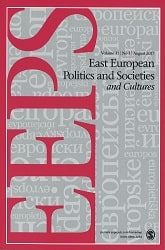Anti-Political or Just Anti-Communist? Varieties of Dissidence in East-Central Europe and Their Implications for the Development of Political Society
Anti-Political or Just Anti-Communist? Varieties of Dissidence in East-Central Europe and Their Implications for the Development of Political Society
Author(s): Alan RenwickSubject(s): Political Philosophy, Civil Society, Political history, Government/Political systems, Politics and society, Post-Communist Transformation, Sociology of Politics
Published by: SAGE Publications Ltd
Keywords: anti-politics; anti-communism; dissidents; civil society; political society; Czechoslovakia; Hungary; Poland;
Summary/Abstract: Several authors argue that the heritage of dissident ideas and activity in East-Central Europe has hindered the development of post-communist political society. But this proposition has not been subject to systematic analysis. This article focuses on one part of that proposition: whether dissident ideas corresponded to the features of “ethical civil society” that some argue harm political society. Concentrating on Czechoslovakia, Hungary, and Poland, it differentiates eight varieties of dissident thought. It then assesses the relation of the three most important varieties to ethical civil society, finding that one variety resembled ethical civil society very closely, another only marginally, and the third not at all. It finally draws out implications for the study of political society in the region.
Journal: East European Politics and Societies
- Issue Year: 20/2006
- Issue No: 02
- Page Range: 286-318
- Page Count: 33
- Language: English
- Content File-PDF

